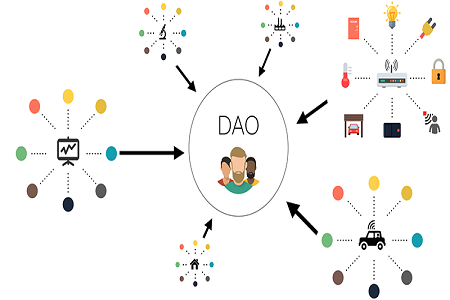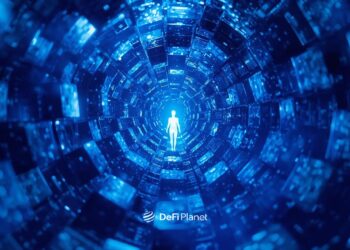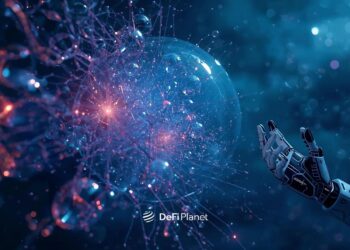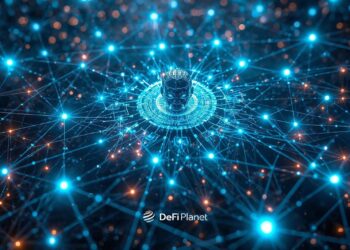Last updated on July 25th, 2025 at 08:09 am
Since the inception of Bitcoin more than a decade ago, the crypto and blockchain industry has come a long way. Before we were introduced to them, the financial sector relied on banks as central authorities to ensure the safety of our money. This system was plagued with an age-old infrastructure that involved long-drawn processes which could be automated with blockchain technology.
One of the main benefits of using a blockchain is the prospect of decentralization. Using blockchain technology, one can replace the banks and instead align the interests of all the stakeholders of the system to create trust. Moreover, with the application of smart contracts, all the processes could be automated and become self-executed thus removing the need for middlemen.
One such product of blockchain technology and application of smart contracts is the Decentralized Autonomous Organization (DAO). These are complex smart contract-based structures that are currently disrupting almost every industry.
In this article, we’ll talk about what DAOs are and how they are different from traditional organizations. We will also look at some of the existing real-world projects based on this model.
Let’s dive in.
What Is A DAO?
A Decentralized Autonomous Organization (DAO) is an organization built on the blockchain that aims to address the principal-agent dilemma.
The principal-agent dilemma is present wherever there is an organization structured in a way in which an entity or the agent acts as the central authority. This agent has the responsibility of making decisions on behalf of the entire entity or the principal. The principal-agent dilemma says that whenever such an entity exists, there is an inherent risk in the divergent goals, priorities, and safeguarding of the interest of all stakeholders. This means there is a risk that the agent might at some point be motivated to act according to its own self-interest rather than looking out for the interests of the principal and its stakeholders.
In the present world, the principal-agent dilemma is a challenge that impacts almost every industry. DAOs aim to address this challenge by creating a trustless system that bypasses the need for such hierarchical systems. With DAOs, the trust factor is transferred from a single agent to the smart contract code which is transparent and can be verified by anyone in the organization.
DAOs can be used in many real-world scenarios. Here are a few examples:
- Venture Funds – In a venture fund, investors can pool investment capital and have voting systems set for choosing businesses that the organization wants to back.
- A network of freelancers – A network of contractors can decide to come together and pool their funds to pay for office spaces and appliances.
- Charities – A charity can be created that accepts donations from anyone in the world. The group of founding members can decide how and where the donations will be spent.
How Are DAOs Different?
To understand how DAOs are different, let’s look at a comparison between a DAO and a traditional organization.
| DAO | Traditional Organization |
| Financial transactions and rules are recorded on a blockchain | A central authority facilitates the transactions and takes the decisions |
| Fully democratized with a flat structure | The hierarchical structure that relies on a single entity’s opinions |
| For changes to be implemented, all the members need to vote | Depends on the structure of the organization – In most cases, changes depending on the sole discretion of a central authority |
| Every action is fully transparent and public | Activities are private |
| Services offered are largely automated | Services offered to rely on human intervention |
How Do DAOs Work?
Different blockchain projects using the DAO model can have different mechanisms. While there is no specific mechanism that DAOs need to follow to function, there are a few general steps that a DAO goes through before launch:
- Setting Up The Smart Contract – Smart contracts are the backbone of a DAO as it defines the rules of the organization. More importantly, the smart contract holds the DAO’s treasury. Before a DAO can be launched, the underlying rules need to be encoded in a series of smart contracts.
This phase is arguably the most important step to create a sustainable and autonomous DAO as it sets up the base for the future. All the rules, systems, structures, and incentives set up at this stage will be deployed in the beginning, and to be changed, voting will have to take place.
- Funding – Once the base technology and rules have been set up, the DAOs work on collecting funds to operate. The funds of a DAO are encoded onto a smart contract which acts as the organization’s treasury. The funds are created and distributed in the form of a native token of the DAO. This token can be spent by the DAOs, used for voting, or offer incentives.
- Deployment – After the rules have been set up and the funding has been received, a DAO is ready to be deployed. As all the decisions of a DAO take place through a consensus vote, all the native token holders become stakeholders in the organization.
If the rules and policies set in the underlying smart contract architecture are well-designed, all the members of the DAO will have incentives to work towards the overall benefits of the entire organization. Thus, the DAO launched after all these phases of development can operate independently without the involvement of any central authority.
What Was A DAO Previously?
An early example of the modern-day decentralized autonomous organizations was The DAO. Initially touted as a revolutionary project, the DAO raised $150 million in ETH and was one of the greatest crowdfunding efforts till then.
Launched in 2016, it was an automated organization designed to act as a form of venture capital fund. The members of the DAO held tokens that represented their risks to profit from the organization’s investments. They could benefit either by reaping dividends or from the price appreciation of the DAO token.
The DAO was launched on April 30, 2016, and a few days into the token sale, some developers raised concerns over a bug in the DAO’s smart contract. On June 17, 2016, a hacker exploited this said bug and managed to move over 3.6 million ETH tokens worth over $70 million at that time. At that time, around 14% of the total ETH in circulation was invested in the DAO and the hack was a significant blow to both the Ethereum network and to DAOs in general.
However, as the funds were moved to a “Child DAO”, they could not be moved for 28 days. This gave the Ethereum community time to fix the bug. Ethereum co-founder Vitalik Buterin proposed a soft fork of the blockchain to blacklist the attacker’s address and prevent him from moving the funds. In the end, the community made a hard fork to the chain which is now known as Ethereum, and left the old fork, Ethereum Classic behind.
Existing DAO Projects In The Real World
Currently, many blockchain projects have fully incorporated the decentralized governance mechanisms proposed by DAOs. This concept is particularly common within the DeFi ecosystem with MakerDAO leading the way.
Here are some existing blockchain projects that embody the core concepts of a DAO:
- Bitcoin – The Bitcoin network is considered by many to be the first application of the DAO. This is because the network is open and permissionless and operated according to the consensus protocol coordinated by the vast network of participants. While the Bitcoin network embodies some core concepts of a DAO, it must be noted that it lacks the governance mechanisms that are associated with DAOs.
- MakerDAO – Built on the Ethereum blockchain, MarkerDAO is a DeFi platform that allows users to lend and borrow. It is the protocol that launched the stablecoin DAI. Since its inception, the MakerDAO Foundation has taken several steps to achieve full decentralization of the organization. The goal of the foundation is to make itself obsolete and pass the full ownership of the project to its stakeholders.
- Uniswap – Uniswap is a DeFi lending protocol that released a native governance token called UNI in September 2020. The release of the UNI token was a sign of the project’s move towards a decentralized and community-owned protocol. However, many concerns have been raised regarding the degree of decentralization of the protocol. This is because of the protocol’s governance model which has a minimum threshold of 1% of the total UNI supply in order to submit any governance proposals. This effectively restricts 99% of UNI holders with less than 1% of the total supply from proposing any changes to the protocol.
Do We Await An Autonomous Future?
While there are many challenges and complexities involved in deploying a sustainable DAO, we believe that the concept of DAOs is here to stay. DAOs have the potential to evolve the corporate governance protocol by distributing the power across the stakeholders of an organization, moving away from the concept of having a central authority with all the power.
What are your views on DAOs? Do you think we will see more such DeFi projects launched in the future?
If you would like to read more articles like this, follow DeFi Planet on Twitter and LinkedIn.





















